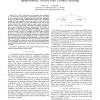Free Online Productivity Tools
i2Speak
i2Symbol
i2OCR
iTex2Img
iWeb2Print
iWeb2Shot
i2Type
iPdf2Split
iPdf2Merge
i2Bopomofo
i2Arabic
i2Style
i2Image
i2PDF
iLatex2Rtf
Sci2ools
115
click to vote
ICASSP
2008
IEEE
2008
IEEE
Link throughput of multi-channel opportunistic access with limited sensing
—We aim to characterize the maximum link throughput of a multi-channel opportunistic communication system. The states of these channels evolve as independent and identically distributed Markov processes (the Gilbert-Elliot channel model). A user, with limited sensing and access capability, chooses one channel to sense and access in each slot and collects a reward determined by the state of the chosen channel. Such a problem arises in cognitive radio networks for spectrum overlay, opportunistic transmissions in fading environments, and resource-constrained jamming and anti-jamming. The objective of this paper is to characterize the optimal performance of such systems. The problem can be generally formulated as obtaining the maximum expected long-term reward of a partially observable Markov decision process or a restless multi-armed bandit process, for which analytical characterizations are rare. Exploiting the structure and optimality of the myopic channel selection policy established...
ICASSP 2008 | Maximum Link | Multi-channel Opportunistic Communication | Partially Observable Markov Decision Process | Signal Processing |
Related Content
| Added | 30 May 2010 |
| Updated | 30 May 2010 |
| Type | Conference |
| Year | 2008 |
| Where | ICASSP |
| Authors | Keqin Liu, Qing Zhao |
Comments (0)

